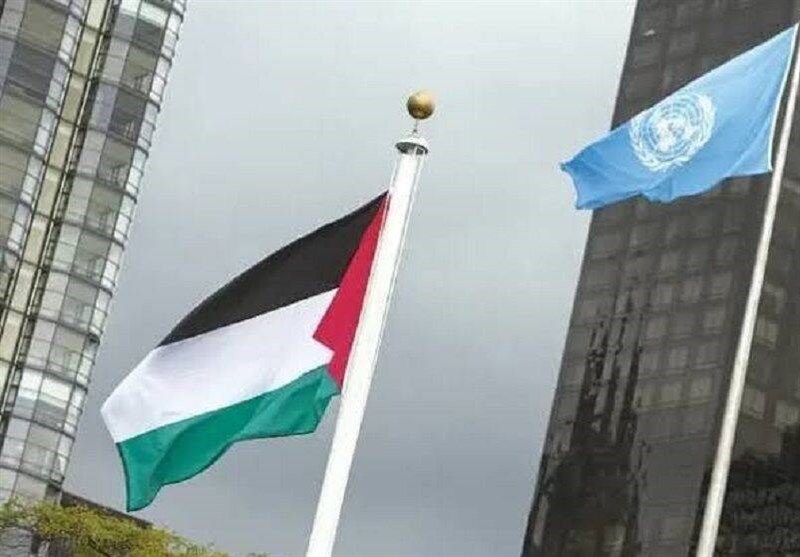Palestinian flag at the World Health Organization.
Following international reports on the humanitarian catastrophe and the collapse of the humanitarian system in Gaza, Hanan Balkhi, the regional director of the World Health Organization, announced that the Gaza Strip is experiencing one of the worst hunger crises in the world due to the devastating war that Israel has waged against the strip and the suffocating siege imposed on it.
Gaza is witnessing the worst hunger crisis
Hanan Balkhi, during a press conference in Geneva, stated: The situation in Gaza is catastrophic and more than 1,500 attacks have been carried out on the health sector in Gaza and the West Bank since October 2023. Currently, one in five people in Gaza is struggling with acute hunger, and we call for the implementation of international humanitarian law, the lifting of the siege and the establishment of an immediate ceasefire in Gaza. Although 400 trucks carrying humanitarian aid were allowed to enter Gaza through the Karm Abu Salem crossing in recent days, only 115 trucks entered the strip, and none of them reached the northern part of the Gaza Strip, which is under a severe siege.
Many medical supplies in Gaza have run out
He added: “The World Health Organization has not been able to send a single truck carrying medical aid into Gaza for more than 11 weeks, and Gaza is currently experiencing a shortage of 64 percent of medical equipment, 43 percent of essential medicines and 42 percent of vaccines. Can you imagine a doctor treating broken bones without anesthesia? But this happens in Gaza, and even the most basic equipment, including bandages, antibiotics and painkillers, is in alarming shortage in Gaza.” 51 trucks carrying medical aid from the World Health Organization are stuck behind Gaza crossings and are not being allowed to enter.
Disaster in Gaza hospitals / The sick and injured are doomed to die
A disaster of thirst in Gaza; children dying for a drop of water
The WHO official noted: The situation in Gaza is catastrophic, and this situation not only threatens the people of Gaza at present, but will also severely affect future generations. Stocks of 42 percent of essential medicines and vaccines and 64 percent of medical equipment in Gaza have reached zero, and none of the trucks carrying medical aid have been able to enter Gaza.
The right to raise the Palestinian flag at the World Health Organization was approved
In another context, the World Health Organization yesterday, Monday, during a vote at the World Health Organization General Assembly, approved a resolution to raise the flag of the State of Palestine at the organization’s headquarters in Geneva. 95 countries voted in favor of this resolution, 27 abstained, and four parties, including Israel, voted against it. This decision was also met with strong protest from the representative of the Zionist regime.
In response to this action by the World Health Organization, Ibrahim Khreisheh, the Palestinian ambassador to the United Nations in Geneva, noted: Although this action is a symbolic step, it is a sign of Palestine’s position as part of the international community and indicates the fact that we are part of the international community and want to play a role in meeting health needs.
He added: We hope that Palestine will be able to gain full membership in the World Health Organization and other UN institutions in the near future.
While the representative of the occupying regime described the resolution as illogical, the representative of Palestine said: After 19 months of Israel’s genocidal war against Gaza and the issuance of arrest warrants for the regime’s leaders by the International Criminal Court, Israel’s membership in international organizations should be reviewed.
Yesterday, at its seventy-eighth session in Geneva, the World Health Organization adopted three resolutions in favor of Palestine in light of the continued systematic attacks by the Zionist regime against hospitals and health centers in Gaza and the killing and arrest of medical personnel.

